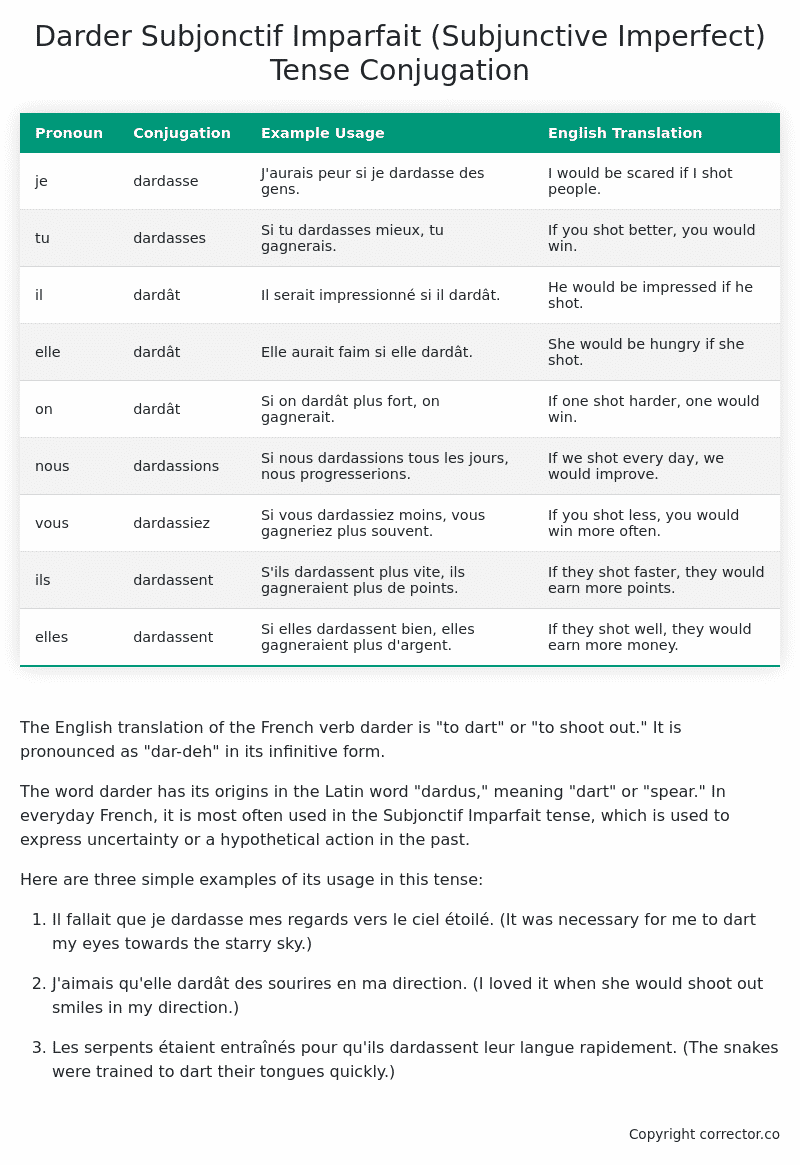Subjonctif Imparfait (Subjunctive Imperfect) Tense Conjugation of the French Verb darder
Introduction to the verb darder
The English translation of the French verb darder is “to dart” or “to shoot out.” It is pronounced as “dar-deh” in its infinitive form.
The word darder has its origins in the Latin word “dardus,” meaning “dart” or “spear.” In everyday French, it is most often used in the Subjonctif Imparfait tense, which is used to express uncertainty or a hypothetical action in the past.
Here are three simple examples of its usage in this tense:
-
Il fallait que je dardasse mes regards vers le ciel étoilé. (It was necessary for me to dart my eyes towards the starry sky.)
-
J’aimais qu’elle dardât des sourires en ma direction. (I loved it when she would shoot out smiles in my direction.)
-
Les serpents étaient entraînés pour qu’ils dardassent leur langue rapidement. (The snakes were trained to dart their tongues quickly.)
Table of the Subjonctif Imparfait (Subjunctive Imperfect) Tense Conjugation of darder
| Pronoun | Conjugation | Example Usage | English Translation |
|---|---|---|---|
| je | dardasse | J’aurais peur si je dardasse des gens. | I would be scared if I shot people. |
| tu | dardasses | Si tu dardasses mieux, tu gagnerais. | If you shot better, you would win. |
| il | dardât | Il serait impressionné si il dardât. | He would be impressed if he shot. |
| elle | dardât | Elle aurait faim si elle dardât. | She would be hungry if she shot. |
| on | dardât | Si on dardât plus fort, on gagnerait. | If one shot harder, one would win. |
| nous | dardassions | Si nous dardassions tous les jours, nous progresserions. | If we shot every day, we would improve. |
| vous | dardassiez | Si vous dardassiez moins, vous gagneriez plus souvent. | If you shot less, you would win more often. |
| ils | dardassent | S’ils dardassent plus vite, ils gagneraient plus de points. | If they shot faster, they would earn more points. |
| elles | dardassent | Si elles dardassent bien, elles gagneraient plus d’argent. | If they shot well, they would earn more money. |
Other Conjugations for Darder.
Le Present (Present Tense) Conjugation of the French Verb darder
Imparfait (Imperfect) Tense Conjugation of the French Verb darder
Passé Simple (Simple Past) Tense Conjugation of the French Verb darder
Passé Composé (Present Perfect) Tense Conjugation of the French Verb darder
Futur Simple (Simple Future) Tense Conjugation of the French Verb darder
Futur Proche (Near Future) Tense Conjugation of the French Verb darder
Plus-que-parfait (Pluperfect) Tense Conjugation of the French Verb darder
Passé Antérieur (Past Anterior) Tense Conjugation of the French Verb darder
Futur Antérieur (Future Anterior) Tense Conjugation of the French Verb darder
Subjonctif Présent (Subjunctive Present) Tense Conjugation of the French Verb darder
Subjonctif Passé (Subjunctive Past) Tense Conjugation of the French Verb darder
Subjonctif Imparfait (Subjunctive Imperfect) Tense Conjugation of the French Verb darder (this article)
Subjonctif Plus-que-parfait (Subjunctive Pluperfect) Tense Conjugation of the French Verb darder
Conditionnel Présent (Conditional Present) Tense Conjugation of the French Verb darder
Conditionnel Passé (Conditional Past) Tense Conjugation of the French Verb darder
L’impératif Présent (Imperative Present) Tense Conjugation of the French Verb darder
L’infinitif Présent (Infinitive Present) Tense Conjugation of the French Verb darder
Struggling with French verbs or the language in general? Why not use our free French Grammar Checker – no registration required!
Get a FREE Download Study Sheet of this Conjugation 🔥
Simply right click the image below, click “save image” and get your free reference for the darder Subjonctif Imparfait tense conjugation!

Darder – About the French Subjonctif Imparfait (Subjunctive Imperfect) Tense
Formation
Common Everyday Usage Patterns
Interactions with Other Tenses
Subjonctif Présent
Indicatif Passé Composé
Conditional
Conditional Perfect
Summary
I hope you enjoyed this article on the verb darder. Still in a learning mood? Check out another TOTALLY random French verb conjugation!


